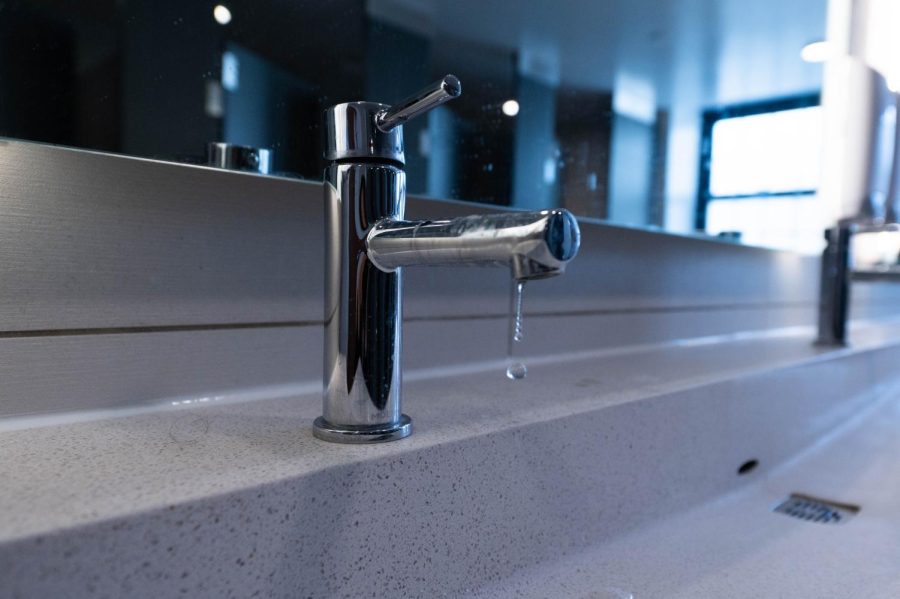Evanston drowns competition in Illinois tap water taste test
Katie Chen/The Daily Northwestern
Evanston’s tap water won the taste test at the Illinois Section of the American Water Works Association’s annual conference in March.
April 11, 2023
In high school, Darrell King always wanted to win a state championship. As a football player and track runner in North Chicago, he never lived out his dream.
But King, now chief of Evanston’s Water Production Bureau, finally won his long-awaited state championship in March, after four judges declared Evanston’s tap water the best tasting in Illinois.
“I always wanted one, so I feel like I got one now,” King said. “I’m very excited about it.”
Evanston won the water taste test at the Illinois Section of the American Water Works Association’s “WATERCON” conference in Springfield last month, giving its tap water a chance to advance to a national competition. In June, Evanston’s water will face off against other state champions at AWWA’s ACE conference in Toronto.
King said Evanston’s tasty tap water comes down to its source: Lake Michigan.
“(Like) when you think about the food we eat, you want to source it from a really good source, and that’s where it all begins,” he said.
Lake Michigan is one of the largest bodies of freshwater in the country.
King said drawing from the lake makes Evanston’s water treatment process easier as freshwater is free of high levels of salt and minerals, which can affect the taste and quality of water. Groundwater, on the other hand, can have high levels of dissolved minerals.
River water can also be dirty because it flows faster than lake water, causing it to pick up more dirt that mixes in with the water. Chemicals like chlorine are required to keep it clean.
Evanston uses a “conventional treatment” process for its water, King said. Water is collected into three intakes which then send water to the treatment plant, located on Lake Michigan’s shore just north of Northwestern’s Evanston campus.
The next step is coagulation and flocculation, in which small particles like dirt stick together into larger clumps that can then be easily removed from the water. Chlorine is added to help disinfect the water and fluoride is put in to prevent tooth decay.
Then, during filtration, the water flows through layers of sand, which remove remaining particles. Before the water is distributed to homes and businesses, phosphate is added to help prevent metals like lead or copper from entering the water.
The city continually tests the water throughout the treatment process by using automated meters and samples to confirm the digital measurements, according to City Chemist Eleanore Meade.
Evanston provides tap water to the entire city and surrounding municipalities, including Skokie and Arlington Heights. Over 365,000 people receive their water from Evanston’s Water Treatment Plant, according to the city’s website.
Each year, Illinois’ tap water contest starts with regional taste tests. Eight winners from those regions advance to the final round at Watercon.
Annie Storey, Executive Director of ISAWWA, said the water is judged based on three categories.
“We look at appearance, so making sure it’s not cloudy. We look at the aroma, so does it have an unpleasant odor coming from it?” Storey said. “And then we look at the overall taste of it.”
This year’s contest had four judges, including water professionals from Minneapolis and Detroit. To avoid potential conflicts of interest, none of the judges were involved with water plants in Illinois, Storey said.
Judges also tasted the water without knowing which municipality it’s from.
In addition to his state championship, King won the tap water equivalent of Most Valuable Player in February when he was named the ISAWWA’s Water Professional of the Year.
King credited Evanston’s accolades to the “great care” the Water Production Bureau puts into its work.
Meade is also glad the bureau’s work is finally getting recognized.
“A lot of our work goes unnoticed,” Meade said. “People turn on the tap and it’s just taken for granted. So it’s nice to get recognition that we’re very serious about our work.”
Email: [email protected]
Twitter: @saullpink
Related Stories:
— Darrell King makes a splash as the next ISAWWA Water Professional of the Year
— Water intake replacement project set to begin mid-March
— Evanston and Skokie enter new water contract after price disagreements


